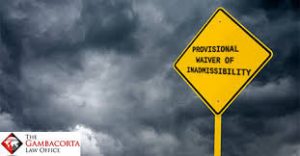The I-601A is also known as the “Provisional or Stateside Waiver ” that grants immediate relatives of United States Citizens to apply for a pardon to avoid the three or ten-year bar for accumulating unlawful presence before leaving the U.S. to attend an interview at the U.S. Consulate of the foreigner’s home country.
The waiver is like an official pardon that enables applicants the freedom to remain in the U.S. and to move one step closer to obtaining a U.S. green card if they become the primary recipients of an approved I-601A waiver also known as “El Perdon”.
When is an I-601A Most Needed?
Since 1996, Congress issued a law that bars undocumented foreigners for three to ten years from re-entering the United States, if they accumulated unlawful presence for several days, months and years.
In this case persons are declared undocumented if they:
- Crossed the U.S. Borders without inspection either from Mexico or Canada.
- Entered the United States on a U.S. Visa but refused to leave the country before the expiration date of the U.S. Visa.
- Foreigners over the age of 18 who accumulate 180 days or more of unlawful presence after April 1, 1997 and exit the country are barred for 3 years from re-entering the U.S.
The same applies for illegal entrants who are over the age of 18, who have lived in the U.S. for one year or more without any legal documents and after April 1, 1997 and then vacate the country will be barred for 10 years.
These are some instances when an I-601A provisional waiver will be most needed. However, an I-601A Provisional waiver may not be able to grant an amnesty if the applicant has committed Fraud (in the form of misrepresentation by giving a false name), has committed a serious crime or an immigration violation or the applicant has some serious health problems that pose a high risk or the person is found to be a public charge by a U.S. immigration judge.
Benefits of an I-601A Provisional Waiver
Thousands of undocumented immigrants are reluctant to leave the U.S to validate their
undocumented status especially when they fear facing the unknown and automatically assume that the waiver will not be granted. The provisional waiver grants two benefits:
- Once the provisional waiver is granted the applicant stands a better chance at receiving his immigrant visa. The U.S. Consulate will provide the immigrant visa a few days after the Consular interview.
- Applicants who do not qualify for the provisional waiver must file a regular Form I-601 Application for Waiver of Grounds of Inadmissibility immediately after having attended an interview. In contrary, Form I-601A applicants already have in hand the provisional waiver when appearing for their interview.
But in the event they have grounds of inadmissibility, the U.S. Consulate usually provides the immigrant visa after USCIS has pardoned the accumulated unlawful presence. - The recipient will only have to wait a short time in his or her own foreign country and will be separated from his family in the U.S. for a short time until the U.S. Consulate distributes the immigrant visa.
Applying for an I-601A Provisional Waiver
When applying for a provisional waiver, applicants:
- should be the primary beneficiary of an authorized immigrant visa that categorizes the main applicant as an immediate relative of a U.S. citizen.
- must seek an immigrant visa at the U.S. Consulate at their designated home country instead of applying for an adjustment to permanent residence in the U.S.
- must have an outstanding immigrant visa case pending with the U.S. Department of State (DOS).
- are required to pay the immigrant visa processing fee to the U.S. Department of State.
- must completely fill-out and sign a Form I-601A provisional unlawful presence waiver with USCIS along with the proper application.
- must be sure to pay biometric fees.
- must remember to include supporting documents to corroborate your claim that qualifying relative will become the subject of extreme hardship if the waiver is not granted and if main applicant is forcibly removed out of the United States of America.
Once USCIS disapproves of your Form I-601A, you may not appeal the decision or file a motion to reopen or reconsider the decision. If you have time on your hands, refile a new waiver application and provide additional evidence and make payments again. At this stage you might need the assistance of an experienced immigration attorney.
Consult Legal Advice and Representation Today From an Immigration Lawyer
Consult with an expert immigration lawyer and he will show you if you have any options available and then he will pilot you through the entire process. The Gambacorta Law Office is here to help you. Feel free to call us anytime at 847-443-9303 for an office consultation at any of our given locations in Arizona and Illinois.

